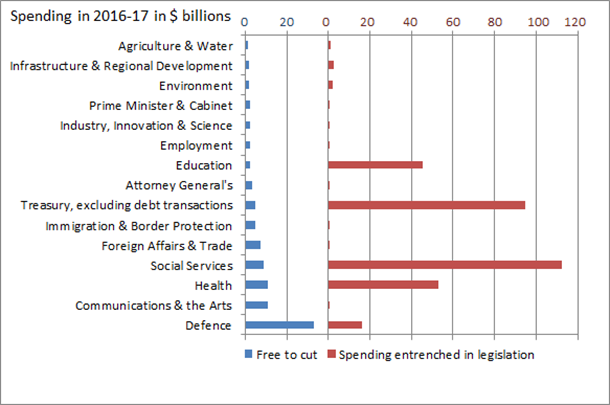The Government often blames the Senate for blocking spending cuts, and it is true that $340 billion of the annual Commonwealth Government spend is based on legislation passed by previous parliaments. So if cuts are to be made to that spending, Senate approval is required.
But $100 billion of the annual Commonwealth Government spend is not underpinned by legislation. So cuts to this spending can be achieved in the budget bills, which are routinely passed by the Senate. No additional legislation needs to pass.
As the chart indicates, the spending that can be readily cut without risking Senate hindrance (shown in blue) is spread out across all government portfolios, with a lot of it falling under the Defence, Communications & Arts, and Foreign Affairs & Trade portfolios. Given the capacity to cut in these areas, the Senate is no excuse for continuing budget deficits.
Advertisement

The $340 billion of annual spending that is underpinned by legislation and can only be cut with explicit Senate approval (shown in red) largely reflects state grants and welfare, health and education spending. There are a number of reasons for optimism in winning Senate approval for cuts in these areas.
Firstly, Prime Minister Turnbull did not promise before the election that there would be “no cuts to education, no cuts to health, no change to pensions, no change to the GST and no cuts to the ABC or SBS”. That was a different Prime Minister, before a different election. Prime Minister Turnbull actually made an election commitment to live within our means.
Secondly, the Senate has changed. Glenn Lazarus, Ricky Muir, John Madigan and Palmer United’s Dio Wang are gone. Each of these former Senators voted against spending cuts in the last parliament, such as cuts to subsidies for bachelor and higher degrees at public universities. Each spending cut from the last parliament should be retested in the new parliament, which has already shown greater fiscal responsibility than its predecessor. Cuts to subsidies to doctors under Medicare, cuts to drug subsidies under the Pharmaceutical Benefits Scheme, and an increase in the eligibility age for the age pension, should be back on the table.
A third cause for optimism is that, although Jacqui Lambie and Nick Xenophon are still in the Senate, Senator Xenophon is feeling more heat to pass spending cuts now than he felt in the last parliament. Recent media attacks on his opposition to spending cuts have stung. He hates being compared to the Greens based on his voting record. Increasingly he will have to back up his centrist claims with support for financial responsibility. And even Xenophon has to acknowledge that, since it’s a decade since the Global Financial Crisis and the wave of baby boomer retirements is nearly upon us, if we don’t balance the budget now, we never will.
The real resistance to responsible budgeting comes from within the Government. A backbench‑driven unwillingness to make sensible spending cuts, such as including million dollar houses in the age pension means test, is a good example. And yet, early in the parliamentary term, now is the time for the Coalition to grow a pair and deliver a budget the nation needs.
Advertisement
The Treasurer has a choice when it comes to drawing up the coming budget, and it would serve us all if he considered the option of not starting from where the last budget left off.
Discuss in our Forums
See what other readers are saying about this article!
Click here to read & post comments.
2 posts so far.